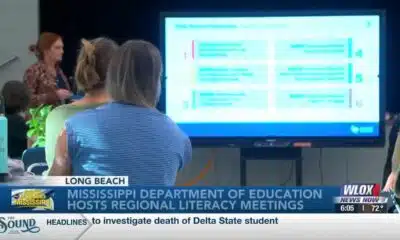News from the South - Arkansas News Feed
Hurricane Helene causes major destruction
SUMMARY: Videos show the Jacksonville Skyline, where bright flashes thought to be lightning turned out to be transformers blowing, as over a million people in Florida are without power. Marine deputies in Fort Myers are preparing for rescue missions. Florida Governor Ron DeSantis warned of likely additional loss of life and significant property damage due to the storm. As Hurricane Helen moves into Georgia, rescues have begun in Atlanta amid severe flooding caused by the storm. The situation is dire, with many residents facing the loss of homes and ongoing challenges from the storm’s aftermath.
Millions are without power and att least three people are dead in Florida and Georgia after Hurricane Helene made landfall. Here’s the latest on recovery efforts. (Via: CBS)
News from the South - Arkansas News Feed
NW Arkansas Championship expected to bring money to Rogers
SUMMARY: The Northwest Arkansas Championship in Rogers is more than a golf event; it significantly boosts the local economy. Drawing thousands annually, it brings steady crowds benefiting restaurants, shops, and service providers. Businesses report increased sales, especially in food and hydration products, with parking lots near the course filling quickly. The Rogers Chamber estimates the tournament injects around $14 million into the local economy, supporting small businesses. Starting tomorrow with a 5K event at the LPGA, this week-long tournament is a dependable source of customer traffic and highlights Rogers’ growth as a regional hub.
Rogers businesses make money off the LPGA’s NW Arkansas Championship.
40/29 is your home for Northwest Arkansas and the River Valley breaking news and weather. For your latest Northwest Arkansas and the River Valley news and weather visit: https://www.4029tv.com/
For licensing inquiries: https://www.4029tv.com/licensing
News from the South - Arkansas News Feed
Arkansas medical marijuana sales on pace for record year
SUMMARY: Arkansas medical marijuana sales are on track for a record year, with patients spending over $193 million from January to August 2025—more than $10 million higher than last year. The state currently has 109,000 active patient cards, purchasing over 52,000 pounds of cannabis products. Daily sales average around $800,000, generating more than $21 million in taxes this year. A new law directs part of this tax revenue to combat food insecurity, including eliminating school lunch debt statewide. Since 2019, Arkansas patients have spent over $1.5 billion on medical marijuana, with the state collecting more than $105 million in taxes.
Arkansas medical marijuana sales on pace for record year 40/29 is your home for Northwest Arkansas and the River Valley …
News from the South - Arkansas News Feed
Group in lawsuit say Franklin county prison land was bought before it was inspected
SUMMARY: A group filed a complaint against the Franklin County Prison project, claiming the land was purchased before proper inspection, resulting in unsuitable property acquisition and wasted taxpayer money. A study cited by State Senator Brian King revealed the site cannot supply adequate water for even one home, let alone a 3,000-bed prison. Despite ongoing prison overcrowding and the need for a new facility, concerns remain about the project’s viability. Lawmakers discussed the issue, highlighting overcrowding and early release of violent offenders due to lack of space. The Franklin County Prison project aims to build a 3,000-bed facility, but its future is uncertain amid these challenges.
Group in lawsuit say Franklin county prison land was bought before it was inspected
40/29 is your home for Northwest Arkansas and the River Valley breaking news and weather. For your latest Northwest Arkansas and the River Valley news and weather visit: https://www.4029tv.com/
For licensing inquiries: https://www.4029tv.com/licensing
-
News from the South - Florida News Feed7 days ago
Orlando restaurant owner invites artists to parking lot amid federal fight against street art
-
Local News6 days ago
DNA evidence found near scene of Charlie Kirk’s shooting matches suspect, FBI director says
-
Our Mississippi Home6 days ago
Family of Curious George Creators to Visit de Grummond in Hattiesburg
-
SuperTalk FM5 days ago
Hyde-Smith, Warnock team up to recognize Gold Star Families Remembrance Week
-
Mississippi News Video6 days ago
The Mustard Seed
-
News from the South - North Carolina News Feed7 days ago
White House officials hold prayer vigil for Charlie Kirk
-
Local News7 days ago
Amazon’s Zoox launches its robotaxi service in Las Vegas
-
Mississippi News Video5 days ago
‘Little quiet light’: Family remembers Delta State University student found dead on campus









































